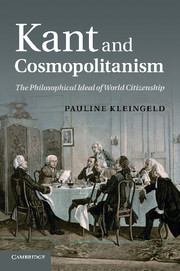Book contents
- Frontmatter
- Contents
- Acknowledgments
- Abbreviations and main primary texts
- Introduction
- Chapter 1 Kant and Wieland on moral cosmopolitanism and patriotism
- Chapter 2 Kant and Cloots on global peace
- Chapter 3 Kant’s concept of cosmopolitan right
- Chapter 4 Kant and Forster on race, culture, and cosmopolitanism
- Chapter 5 Kant and Hegewisch on the freedom of international trade
- Chapter 6 Kant and Novalis on the development of a cosmopolitan community
- Chapter 7 Kant’s cosmopolitanism and current philosophical debates
- Bibliography
- Index
Introduction
Published online by Cambridge University Press: 05 November 2011
- Frontmatter
- Contents
- Acknowledgments
- Abbreviations and main primary texts
- Introduction
- Chapter 1 Kant and Wieland on moral cosmopolitanism and patriotism
- Chapter 2 Kant and Cloots on global peace
- Chapter 3 Kant’s concept of cosmopolitan right
- Chapter 4 Kant and Forster on race, culture, and cosmopolitanism
- Chapter 5 Kant and Hegewisch on the freedom of international trade
- Chapter 6 Kant and Novalis on the development of a cosmopolitan community
- Chapter 7 Kant’s cosmopolitanism and current philosophical debates
- Bibliography
- Index
Summary
The country of world citizens
According to Immanuel Kant, Germans are model cosmopolitans. In his Anthropology from a Pragmatic Point of View of 1798 he writes that they are hospitable toward foreigners, they easily recognize the merits of other peoples, they are modest in their dealings with others, and they readily learn foreign languages. Finally, “as cosmopolitans,” they are not passionately bound to their fatherland (ApH 7:317–18). Germany “is the country of world citizens” where strangers feel at home (R 15:590).
This description is remarkable not just for its evocation of an intellectual world that was about to be swept away, in the early nineteenth century, by a wave of nationalism. It also paints a picture of the cosmopolitan that is quite different from the image of the rootless traveler often associated with the term. The cosmopolitans Kant describes here do not fit the stereotype of the individualistic citizens of nowhere, who relish their unattached and unencumbered existence, are self-satisfied with their self-styled identity, pick and choose cultural tidbits from many parts of the world, and regard the more rooted mortals around them with unmistakable condescension.
- Type
- Chapter
- Information
- Kant and CosmopolitanismThe Philosophical Ideal of World Citizenship, pp. 1 - 12Publisher: Cambridge University PressPrint publication year: 2011

